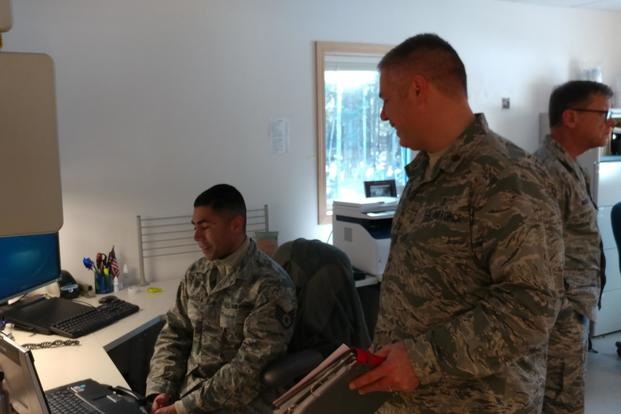A new House subcommittee has been created with essentially one job -- to oversee the Department of Veterans Affairs' latest $10 billion-plus effort to set up electronic health records compatible with those of the Pentagon after past, costly failures.
The VA is undertaking the largest transition to electronic health records (EHR) ever attempted in the U.S., requiring oversight from the new Subcommittee on Technology Modernization, said Rep. Phil Roe, R-Tennessee, chairman of the House Veterans Affairs Committee.
"As the department embarks on the nation's largest overhaul, it is critical that we ensure veterans and taxpayers are protected throughout the transition," he said in a statement Thursday.
Roe, a physician, said he had personally experienced a transition to a new record system while in private practice.
"I know how much potential there is for a project like this to be a costly disruption. Congress has a duty to conduct rigorous oversight every step of the way," he said.
Roe named Rep. Jim Banks, R-Indiana, a former Navy Reserve supply officer and Afghanistan veteran, to head the new subcommittee.
"Service members and veterans deserve a seamless, lifetime medical record and an electronic health record system that supports the highest quality care," Banks said. "However, I have no illusions about the challenge confronting VA in this monumental undertaking."
Since at least 2000, lawmakers and veterans service organizations have been pressing the VA to come up with an EHR system that would work seamlessly with the Defense Department's.
In 2013, then-VA Secretary Eric Shinseki and then-Defense Secretary Leon Panetta announced that they were scrapping a five-year effort to build a common EHR system.
Panetta said he was "frustrated" that the effort failed.
"We can and must do better," he said. "It's been inefficient for service members to have to hand-deliver records from one system to another when they get out of the military."
"Our service members often have extensive records," Panetta continued. "The last thing they need is to worry about their doctors having all the information that they need in order to provide them the care that they deserve."
Last December, the nonpartisan Government Accountability Office released an audit stating that the VA spent about $1.1 billion between 2011 and 2016 on its integrated Electronic Health Record (iEHR) system using the Veterans Information Systems and Technology Architecture Evolution, or VistA Evolution.
Former VA Secretary Dr. David Shulkin, who was ousted by President Donald Trump in March, decided last year that VistA wasn't working in improving interoperability with the DoD and had to be replaced. He began moving toward acquiring off-the-shelf systems from Cerner Corp., of Kansas City, Missouri.
In May, then-acting VA Secretary Robert Wilkie awarded a 10-year, $10 billion contract to Cerner, which could run up to $16 billion with associated costs, to replace the VA's legacy EHR systems.
"President [Donald] Trump has made very clear to me that he wants this contract to do right by both veterans and taxpayers, and I can say now without a doubt that it does," said Wilkie, whose nomination to become the next VA secretary is expected to be confirmed by the full Senate later this month.
Rep. Tim Walz, D-Minnesota, the ranking member of the House Veterans Affairs Committee, said the EHR overhaul at the VA is long overdue.
"For millions of veterans across the country, their first interaction with VA will be the simple act of booking an appointment," he said in a statement. "Unfortunately, even something as straightforward as that can be a struggle due to VA's antiquated information technology systems."
The new subcommittee "will be better suited to hold VA accountable every step of the way" in implementing the Cerner contract, Walz said.
To ease the transition, the VA announced Thursday that it had set up a new Office of Electronic Health Record Modernization (OEHRM).
The VA said the new office "will manage the preparation, deployment and maintenance of VA's new electronic health care record system and the health information technology (IT) tools dependent upon it."
"As technology and the needs of our veterans evolve, we must also evolve our systems to support better care for our veterans," said VA's Acting Secretary Peter O'Rourke.
"This office is dedicated entirely to our electronic health record modernization, and will bring significant and diverse expertise to get VA to the end-state that will allow medical records to transition seamlessly for service members departing active duty into veteran status," O'Rourke said.
The new office will be led by Genevieve Morris, who is currently detailed to the VA from her position as the principal deputy national coordinator for the Department of Health and Human Services.
"We are working hard to configure and design a system focused on quality, safety and patient outcomes, which will allow health IT innovations within one VA facility to be used across the entire VA health-care system," Morris said in a statement.
One of the issues she will have to deal with is the backlog in records transfers. In a late February report, the Pentagon's Inspector General said that the military services are getting better at the quick and accurate transfer of medical records to the VA, but there is considerable room for improvement.
In an update to a 2014 report on the transfers, the IG's office said the Defense Department as a whole has made "significant progress" on the handling of the Service Treatment Records (STRs).
"We remain concerned by the significant number of STRs that were not transferred to the VA in a timely manner, which could delay the VA in approving benefit claims for service members," the IG's office said.
-- Richard Sisk can be reached at Richard.Sisk@Military.com.













